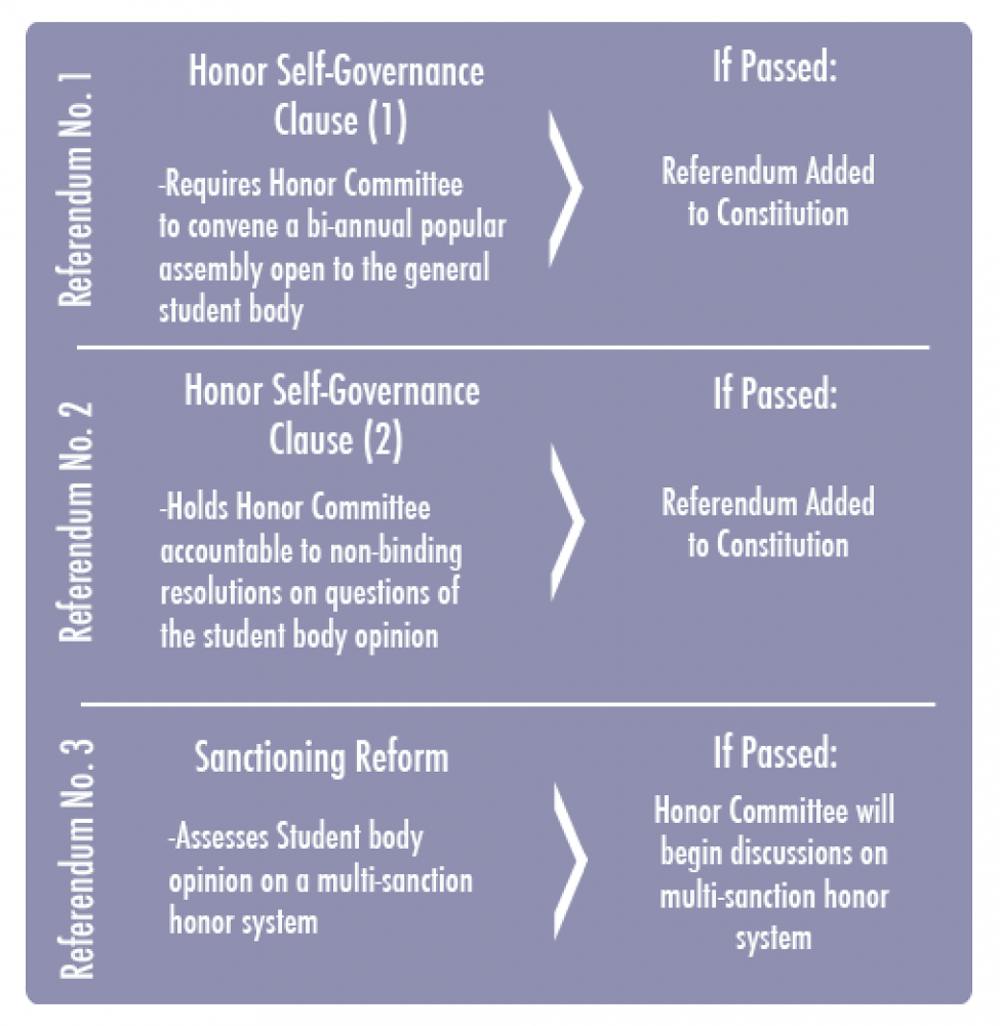A new three-part proposal seeks to implement new procedures for the Honor Committee — including the implementation of a biannual assembly open to the University student body and asking the Committee to consider a multiple-sanction policy.
The proposal, developed by Honor Senior Support Officer Ian Robertson and Honor Support Officer Jaeyoon Park, both third-year College students, also includes a new amendment which would require the Committee to put non-binding referenda to a binding constitutional amendment vote in the following year.
The three motions are a response to what Robertson and Park called a systemic problem with community involvement in the honor system.
“Fundamentally, this campaign is all about making sure that the honor system at U.Va. is more representative of and better self-governed by the student body,” Robertson said. “We want this to change how honor system treats opinion of student body.”
Park said the measures would facilitate greater conversation among students and within the Honor Committee.
“They would bring community issues to the fore and give students the opportunity to discuss with other students — but also potentially with members of the Honor Committee — things they want to see,” he said. “It would give them a forum before the Honor Committee.”
The first referendum, establishing biannual public assemblies, seeks to establish permanent mechanisms for dialogue between the Honor Committee and University community, according to a website Robertson and Jaeyoon created to outline the proposals.
“Every second year, the Honor Committee shall, in accordance with its most fundamental purpose, convene a popular assembly open to the general student body with the following aims: to facilitate discussion on the state of the Honor System; to ascertain the pressing concerns of the community; and to generate potential measures to be put before the student body for consideration,” the referendum reads.
The second referendum would add weight to these discussions, mandating that any non-binding issue of opinion — agreed upon by the majority of University students — be proposed to the community as a binding constitutional amendment to the honor system.
“Should a majority of the student body vote affirmatively on a non-binding question of opinion pertaining to the Honor System in a University-wide election, the Honor Committee shall, in the following year, put such question before the student body as a binding constitutional amendment,” the referendum reads.
These two referenda are being proposed as addenda to the Honor Committee Constitution — which means they will be put to a student vote and enacted if they receive at least 60 percent approval in a University-wide election.
The third referendum — which asks students whether the Honor Committee should consider a multi-sanction system — differs considerably, in that it is a non-binding resolution, not a constitutional amendment. If the second referendum passes and the non-binding resolution receives 51 percent of the student vote, the Committee would be required to consider a multi-sanction system and put the issue to a vote the following year, in spring 2016.
Each referendum requires 500 student signatures to be put up for a study body vote. Should they receive enough signatures, all three will be opened for voting when the University community selects new Honor Committee representatives, from Feb. 20-26.
Robertson and Park said they have not thought much about the specific mechanics of what a new sanctioning system might look like, but were instead focused on first making the honor system more accountable.
“We can talk about what would be most prudent, but ultimately what we’re focused on is that the will of the student body is reflected,” Park said. “All we hope is that, whatever avenue is pursued, that fundamental goal is achieved.”
An Education School study recently showed significant discomfort within student body with the consequences of a single sanction system. However, the Robertson and Park said the study was not part of the referenda proposals.
“Whether we had [Education School] data or not the same concerns would have existed,” Park said. “The new data points are helpful, but the concerns are not new.”
The two said they believe it necessary to ensure student opinion is reflected in Honor Committee procedures.
“No one currently at the University has had the opportunity to vote on the system of a single sanction,” Park said.
Robertson and Park said the essence of the honor system lies in its tradition of student self-governance — not how it sanctions students.
“For too long I think Honor has been associated with the single sanction,” Robertson said. “U.Va. would be unique still in that the honor system would be the only one in country that it is student run.”
Should the second referendum pass, any non-binding motion could be voted on by the student body and subsequently bring about an Honor Committee discussion and amendment in the following year. However, all proposals would have to be legally tenable and in accordance with the honor system as regulated by the Board of Visitors. For this reason, Robertson said any students wishing to pursue a change are encouraged to seek legal counsel from the Office of the Vice President of Student Affairs.
An earlier version of the proposal was briefly live on the campaign’s website Monday, and included a referendum directly adding a multiple-sanction system to the Honor Committee constitution. Robertson said the referenda — specifically the one dealing with multi-sanction discussions — would benefit from greater community input, which the modifications facilitate.
Collection of signatures for the referenda will begin Wednesday, and in order for the proposals to make the ballot, they must be submitted by Feb 12. Voting will begin eight days after on Feb. 20
The referenda can be found here.







